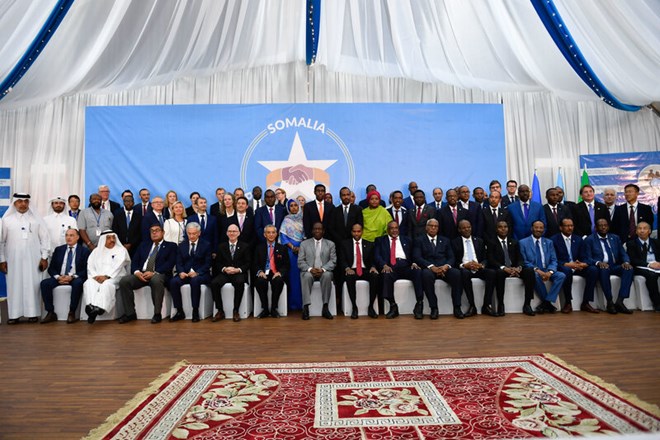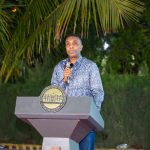Mogadishu (SONNA)-On the occasion of United Nations Day, the UN envoy to Somalia today highlighted the long-running partnership between the world body and the country, and reaffirmed the organization’s support for Somalis now and into the future.
“The United Nations, though we are focused on it today because it’s UN Day, is here in a supporting role. It’s here in a collaborative role – fundamentally to assist Somali institutions, the Somali national government, Federal Member States and other entities in addressing the needs of the people,” said the UN Secretary-General’s Special Representative for Somalia, James Swan.
“We are committed to strong cooperation and alignment, and support for national priorities and objectives,” he added in a virtual press conference held in the Somali capital of Mogadishu.
The date of 24 October has been celebrated as United Nations Day since 1948; it marks the anniversary of the entry into force in 1945 of the UN Charter. With the ratification of this founding document by the majority of its signatories, including the five permanent members of the UN Security Council, the United Nations officially came into being.
In his remarks, the UN envoy spoke of the world body’s multifaceted role which combines it being a set of principles enshrined in the UN Charter and other documents outlining how countries should interact and meet collective aspirations, a grouping of specialized institutions with expertise in areas important to global progress, and its role as a gathering of its Member States coming together to make decisions collectively.
Long partnership
Mr. Swan noted that Somalia’s involvement with the United Nations goes back to even before its independence, while the world body has been a resolute partner and constant presence.
“Somalia has been a proud and full member of the United Nations since its independence 60 years ago. Both the UN and Somalia have worked together throughout that time, and even before as the United Nations supported progress towards independence in 1960,” he said.
“I would note,” he added, “that the United Nations has been here in Somalia through good times and bad. Even in the late 1990s and early 2000s, when there were very few other external actors operating in Somalia, the United Nations was steadfast through its agencies, funds and programmes, and through an ongoing small, political office to continue engagement and to try to support improvement during that period.”
Looking forward, the UN Special Representative noted how the world body’s activities in the Horn of Africa country are aligned with its national priorities, as set out in the Somalia Partnership Forum held in Mogadishu last year, as well as the recent signing with the Federal Government of the UN Sustainable Development Country Framework (UNCF).
The UNCF represents the Federal Government’s and the UN’s collective commitment to support the 2030 Agenda for Sustainable Development and the Sustainable Development Goals (SDGs). The Goals are a universal call to action to end poverty, protect the planet and improve the lives and prospects of everyone everywhere, and were adopted by all UN Member States in 2015 as part of the 2030 Agenda, which sets out a 15-year plan to achieve the SDGs.
In particular, the UNCF outlines ways in which the United Nations intends to support government-owned and government-led priorities. The UNCF’s main pillars of activity directly mirror those of Somalia’s ninth National Development Plan (NDP-9), namely, inclusive politics and reconciliation; security and the rule of law; economic development; and social development.
“This is an effort for us to work together, to be partners, and that is our intent today and going forward,” Mr. Swan said.
On this note, he noted that the United Nations has more than 20 agencies, funds and programmes, as well as two Security Council-mandated missions – the UN Support Office for Somalia (UNSOS) and the UN Assistance Mission in Somalia (UNSOM), the latter of which he also heads – operating in Somalia, supporting activities across the full range of interests and concerns of the Somali authorities and people.
National elections
During the press conference, the UN Special Representative fielded questions which included the world body’s position on Somalia’s national elections.
The envoy noted that the United Nations and a wide array of international partners had advocated for a ‘one person, one vote’ model, as enshrined in the Somali Constitution and supported over many years by Somali leaders, as well as endorsed by the UN Security Council. However, the recent meetings held by Somali leaders in Dhusamareeb and Mogadishu had led to agreement on an indirect model which has received support from a broad array of the country’s political actors.
“We continue to believe that Somalis deserve the opportunity to vote for their leaders,” Mr. Swan responded. “So our view is that while disappointed that it does not represent ‘one person, one vote,’ we nonetheless want this agreed model to succeed. No one has any interest in a failed political process in Somalia.”
He expressed the hope that adjustments made to the agreed model would indeed be respected, including the commitment to 30 per cent women’s representation in the federal parliament, and that the conduct of the selection process in held a way that adds to the diversity of the selection process, involving civil society, community leaders and Federal Member States, for example.
“We also, of course, want to make sure that the process proceeds with maximum transparency and accountability,” Mr. Swan added.
Democratic steps
In his remarks to the media, the UN Special Representative emphasized that there are other steps Somalia could make progress on in on its path to greater democratization.
“Beyond the elections that will take place in this cycle… it’s important to remember that democracy is more than just elections. It’s about building a set of institutions in the country that can support giving people a voice and role in selecting their leaders,” Mr. Swan said.
In this vein, he noted the importance of efforts to secure elements of the country’s revised Constitution that could be agreed upon, including a number of technical provisions that could garner broad support, as well as the establishment of other institutions of government, such as human rights and judicial services commissions.
‘One person, one vote’
Mr. Swan also said now was the time to start preparing for a ‘one person, one vote’ electoral model for Somalia’s next national elections cycle.
“It would be important to begin already looking at what are the measures that need to be put in place in order to prepare for ‘one person, one vote’ in 2024 or 2025. Those measures need to be identified now and put on the calendar and, ideally, agreed on by key political stakeholders right away,” Mr. Swan said.
“Our ambition remains what we think is the ambition of Somalis: to get to ‘one person, one vote,’” he continued. “There’s work to be done right now to make this process as good as possible, but then we need to urgently look ahead to the next cycle and help Somalis put in place systems that ensure we do get to ‘one person, one vote’ in another four years.”





